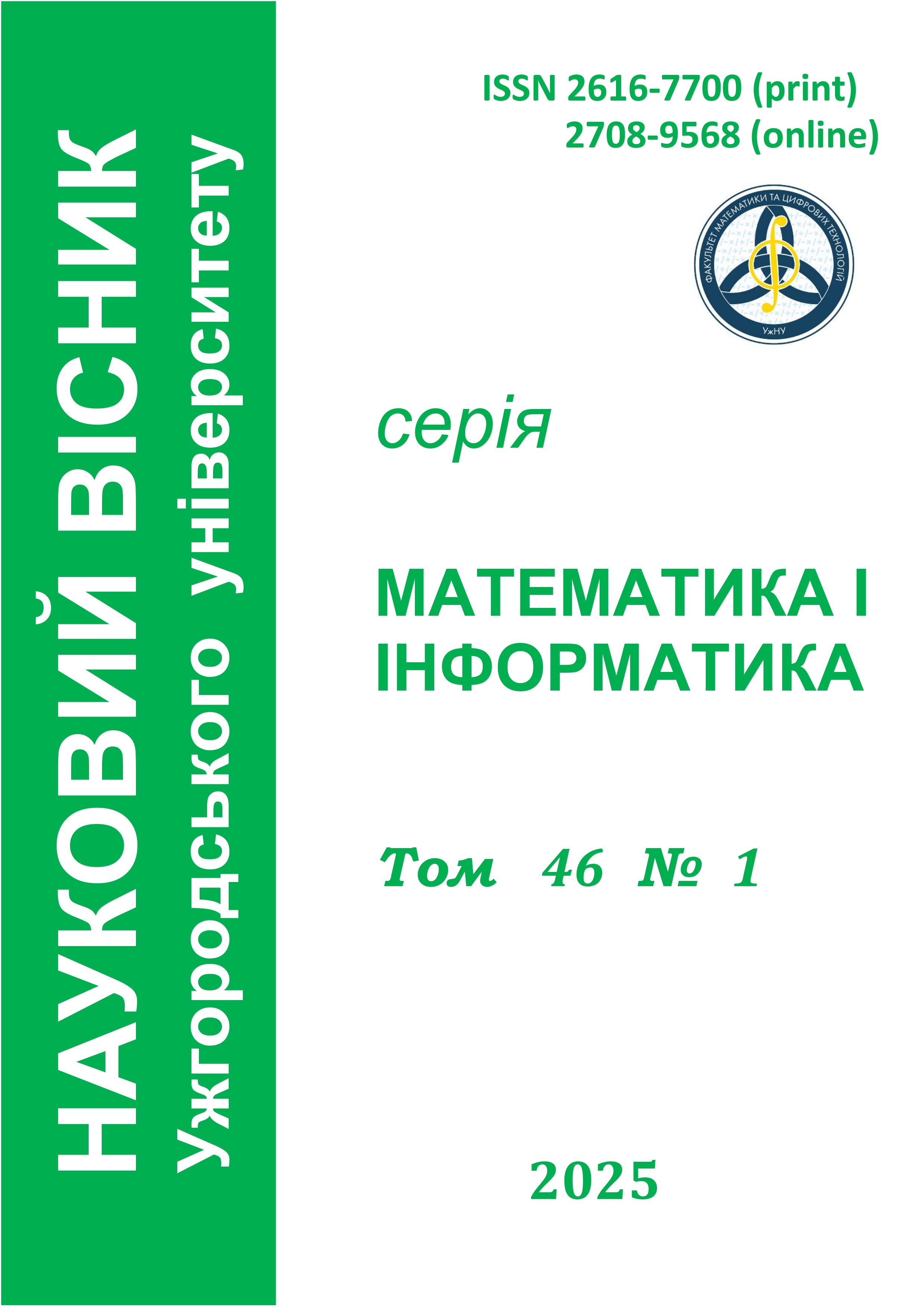Метод послідовного аналізу варіантів із застосуванням спеціалізованих GPT-моделей для автоматизованої перевірки конкурсних наукових робіт
DOI:
https://doi.org/10.24144/2616-7700.2025.46(1).294-304Ключові слова:
метод послідовного аналізу варіантів, GPT-моделі, конкурс наукових робітАнотація
У статті досліджено новий підхід до автоматизації опрацювання документів конкурсних наукових робіт, який базується на поєднанні методу послідовного аналізу варіантів та спеціалізованих LLM-моделей. Запропонований підхід дозволяє значно оптимізувати процес перевірки поданих матеріалів, зменшити навантаження на експертів і підвищити об'єктивність відбору. Робота містить теоретичне обґрунтування використання методу послідовного аналізу у контексті автоматизованого аналізу відповідності поданих робіт вимогам конкурсу. Методика послідовного аналізу адаптована для перевірки конкурсних робіт. На її основі розроблено структурований алгоритм використання спеціалізованих GPT-моделей як багаторівневих фільтрів, що забезпечує поетапну перевірку відповідності поданих матеріалів установленим вимогам. Описана узагальнена інформаційна модель спеціалізованого GPT для опрацювання документів. Запропонований підхід є гнучким та масштабованим, що дозволяє його легко адаптувати для інших сфер.
Посилання
- Damnjanovic, V., Proud, W., & Milosavljevic, M. (2021). Mentoring development at student international business case competitions. EuroMed Journal of Business, 16(2), 154–170. https://doi.org/10.1108/EMJB-12-2018-0092
- Vladoiu, M., Constantinescu, Z., & Moise, G. (2017). A new collaborative paradigm of computer science student contests: An experience. In H. Panetto et al. (Eds.). On the move to meaningful Internet systems. OTM 2017 Conferences. (Vol. 10573). Springer: Cham. https://doi.org/10.1007/978-3-319-69462-7_18
- Blum, J. J. (2023). Competitive programming participation rates: An examination of trends in U.S. ICPC regional contests. Discovery Education, 2(11). https://doi.org/10.1007/s44217-023-00034-1
- Messer, M. (2022). Automated grading and feedback of programming assignments. In: ITiCSE ’22. Proceedings of the 27th ACM Conference on on Innovation and Technology in Computer Science Education. Publication History, 2, 638–639. https://doi.org/10.1145/3502717.3532113
- Gobrecht, A., Tuma, F., & Moller, M. (2024). Beyond human subjectivity and error: A novel AI grading system. arXiv preprint. https://arxiv.org/abs/2405.04323v1
- Divason, J., Ascacibar, F. J., Romero, A., & Sáenz-de-Cabezón, E. (2023). Artificial intelligence models for assessing the evaluation process of complex student projects. IEEE Transactions on Learning Technologies, 1–18. https://doi.org/10.1109/TLT.2023.3246589
- Hnatiienko, H., Domanetska, I., Hnatiienko, O., & Khrolenko, Y. (2024). Tasks’ analysis of the intelligent system for conducting project competitions. Management of Development of Complex Systems, 60, 113–120. https://doi.org/10.32347/2412-9933.2024.60.113-120
- Hnatiienko, H. M., Domanetska, I. M., Hnatiienko, O. H., & Khrolenko, Y. O. (01 October, 2024). Sequential variant analysis scheme in expert technology for evaluating competition proposals in urban transformation. In Applied Information Systems and Technologies in the Digital Society: Proceedings of the VIII International Scientific and Practical Conference. Kyiv. 63–74 [in Ukrainian].
- Voloshyn, O. F., Hnatiienko, H. M., & Kudin, V. I. (2013). Sequential variant analysis: Technologies and applications. Kyiv: Stylos [in Ukrainian].
- Khrolenko, Y. O. (2024). Analysis of modern technologies for organizing and conducting student scientific competitions. Retrieved from https://conference.ikto.net/public/static/about.html [in Ukrainian].
- Regulations on the All-Ukrainian Competition of Student Scientific Papers in Fields of Knowledge and Specialties. (n.d.). Retrieved from https://zakon.rada.gov.ua/laws/show/z0620-17#n101 [in Ukrainian].
- Minaee, S., Mikolov, T., Nikzad, N., Chenaghlu, M., Socher, R., Amatriain, X., & Gao, J. (2024). Large language models: A survey. arXiv preprint. https://doi.org/10.48550/arXiv.2402.06196
- Mohan, G. B., Prasanna Kumar, R., Vishal Krishh, P., et al. (2024). An analysis of large language models: Their impact and potential applications. Knowledge and Information Systems, 66, 5047–5070. https://doi.org/10.1007/s10115-024-02120-8
- Mandvikar, S. (2023). Augmenting intelligent document processing (IDP) workflows with contemporary large language models (LLMs). International Journal of Computer Trends and Technology, 71, 80–91. https://doi.org/10.14445/22312803/IJCTT-V71I10P110
- Kumar, P. (2024). Large language models (LLMs): Survey, technical frameworks, and future challenges. Artificial Intelligence Review, 57, 260. https://doi.org/10.1007/s10462-024-10888-y
- Schnepf, J., Engin, T., Anderer, S., & Scheuermann, B. (2024). Studies on the use of large language models for the automation of business processes in enterprise resource planning systems. In A. Rapp, L. Di Caro, F. Meziane, & V. Sugumaran (Eds.). Natural Language Processing and Information Systems. (Vol. 14762). Springer: Cham. https://doi.org/10.1007/978-3-031-70239-6_2
##submission.downloads##
Опубліковано
Як цитувати
Номер
Розділ
Ліцензія
Авторське право (c) 2025 В. В. Циганок, Я. О. Хроленко

Ця робота ліцензується відповідно до Creative Commons Attribution 4.0 International License.
Автори залишають за собою право на авторство своєї роботи та передають журналу право першої публікації цієї роботи на умовах ліцензії Creative Commons Attribution License, котра дозволяє іншим особам вільно розповсюджувати опубліковану роботу з обов'язковим посиланням на авторів оригінальної роботи та першу публікацію роботи у цьому журналі.








